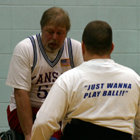
Ray Petty’s involvement in wheelchair sports began in 1990. However, his connection with disability rights and accessible communities began long before that. Ray regards the opportunity to engage in accessible recreation as a natural extension of creating accessible communities in which everyone can fully participate. As an infant, before a vaccine was available, Ray contracted polio that requires him to walk with a brace. Despite his limitations, he was always a “sandlot” athlete, participating in “stand up” sports such as softball whenever possible. He enjoyed the social aspect of team sports as well as the exercise. When he was first approached about playing wheelchair basketball 17 years ago.
Ray was surprised—because he didn’t use a wheelchair. Then he realized that the sport is really for anyone who cannot play by using their legs—and he was hooked! Ray loves the camaraderie of playing on a team and can be found on the basketball court with the Kansas Wheelhawks every basketball season. As an adult Ray has merged his passion for recreational opportunities for people with disabilities with his professional work. He has directed several independent living centers, advocated for changes in Kansas and federal law, and currently serves on the Kansas Commission for Disability Concerns. He works for the Great Plains ADA Center where he provides training and technical assistance on ADA requirements, including how they apply to recreational facilities.
Ray helped establish Kansas Accessible Sports (KAS), a non-profit organization that promotes accessible recreation and raises funds to defray costs associated with wheelchair sports such as renting practice space, buying sports wheelchairs, and traveling to tournaments. Currently KAS is most active in wheelchair basketball, but plans to expand its support of wheelchair softball, water sports, tennis and other activities. Now 57, Ray also serves as president of the Midwest Conference of the National Wheelchair Sports Association, another way that he works to promote accessible sports opportunities.
For others who want to get involved in wheelchair sports or to create more accessible recreation opportunities in their own communities, Ray has some recommendations:
- Connect with activists in other communities who are involved in accessible recreation, perhaps by attending a practice session. They are likely to know the ins and outs of organizing and can advise you about getting something going in your own community.
- Check with disability organizations in your community—such as an independent living center, developmental disability program, etc. Maybe someone else has expressed interest in recreation and they might link you up with that person.
- Contact your local parks and recreation department, which might be at the city or county level. The goal of these departments in providing recreational opportunities extends to those who need accessible recreation.
- Remember, disability rights include the right to recreation, fitness and fun! Think about what you can do to promote your right to be healthier!
